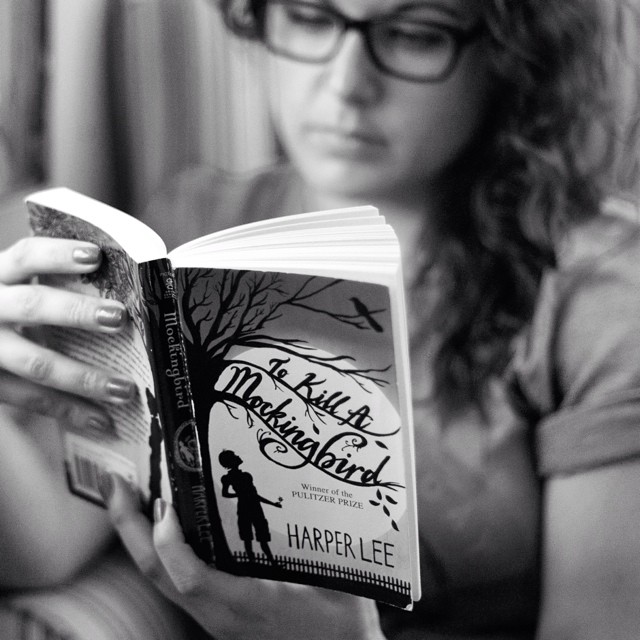“To Kill a Mockingbird” has been removed from RCS curriculum
March 17, 2021
This past January, the decision was made to remove “To Kill a Mockingbird” by Harper Lee from the Rochester Community Schools’ (RCS) curriculum. This change was made following major conversations of social justice in literature, both nationwide and locally, as well as movements to progress society towards racial equality.
Mrs. Ashley Painter, the district’s Secondary Curriculum Consultant for English Language Arts, was the one who this decision ultimately came down to. Using perspectives of teachers, students, parents, and experts, she came to the conclusion that this curriculum alteration was necessary.
“As we’ve been making a commitment our district has to being culturally responsive, looking at a text that uses the n-word and is written by a white author, and a text that also talks about the struggle from a white male hero perspective, we just thought we could find texts that were more inclusive and more culturally responsive to all of those things,” Mrs. Painter explained.
The district emphasizes that their ultimate goal is to make sure students, regardless of identity, see themselves valued and portrayed in the literature they read.
“There is a deliberate intention to make sure that all students can see themselves in the
literature, and to keep social justice at the forefront of learning,” Mrs. Carrie Lawler, the Director of Secondary Education for RCS, said. “RCS has worked hard to make sure that all staff are culturally aware and responsive… I’m very proud of the equity and inclusion work being done throughout RCS. I’m delighted to see the English Language Arts department’s willingness to make decisions and updates based on what is right and relevant for all students.”
This was not the first time conversation of removing Lee’s novel from RCS curriculum has been had. Mr. Frank Gollon, a Rochester High School (RHS) English teacher, can speak to this:
“At first, I was surprised by the decision as I recalled a similar effort several years back that ended with Mockingbird remaining in the curriculum. I was torn as I greatly enjoy some of the activities that we would do with it. Upon research, reflection and discussion with my peers, I agree that there are better titles to use with this unit. A long-running complaint of our ELA titles has been that they are all works from dead white guys (or girl in this case). Our textbook includes writers and writings from around the world and our novels should reflect the same.”
Now that “To Kill a Mockingbird” has been removed, a replacement novel to begin reading in ninth grade English classes beginning next year has to be chosen. There has been talk about enstating a Literature Circle like Mr. Gollon discussed and some discussion about a student panel as well.
“If you’ve ever heard this expression, windows, mirrors, and sliding glass doors: the idea that we want our students to see people and experiences that look like theirs that are different from theirs and that offer maybe a little bit of both,” Mrs. Painter explained when discussing the novel(s) that will be replacing “To Kill a Mockingbird.” “We are a really large district and so we don’t get to purchase novels as often as we like… A lot of our books have been in our curriculum for years and years and years, and this is a direction we’re hoping that we can make some more investment in the future.”
The question became how would current grade nine english teachers go about the unit this year. The official removal of this title will not go fully into effect until the 2021-2022 school year, so it was up to each educator to decide how they wanted to proceed for now.
“I struggled with this question, as did many of my colleagues,” Mr. Gollon shared. “I will be trying a Literature Circle approach that will allow my class to select one of several options to read. ‘Mockingbird’ will be one of the options.”
The movement to move in a direction that is more culturally responsive at the high school level is one that has been seriously discussed. Partially relying on the perspectives of experts and partially on those of people of color have been crucial.
“We have a group of teachers that is doing a book study, and that book we’re reading is called ‘Letting Go of Literary Whiteness,’” Mrs. Painter said. “That book specifically addresses “To Kill a Mockingbird” within the high school curriculum. We’ve been listening to that group and kind of learning as we’ve done some further reading and investigating of the book. It’s a book that we have had students and parents tell us about the difficulties that they had in reading and some of the ways they have just had issues with it.”
Mrs. Lawler, along with the English consultants and teachers, are always looking for new novels to add to RCS curriculum.While analyzing these books, they ask questions about how women and minorities are represented, if the text diminishes a certain group, and how social justice is themed in the novel to ensure the chosen text does not convey prejudice.
Mr. Gollon ended by explaining the role literature plays in society:
“As Atticus teaches us in ‘Mockingbird’, you don’t really understand someone until you consider things from his/her point of view. Racism is one of the negative aspects of our world… The only way we rise as human beings is when we can rise together as one. So long as some are marginalized or discriminated against based on any factor, we prevent everyone from being able to live peaceful, productive lives. Through literature, we can learn to consider the perspectives of others and in so doing, apply these experiences to our own lives.”








